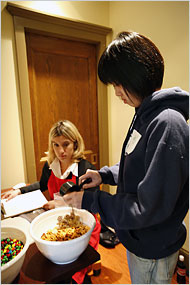How We Eat
 There was an interesting article published today in the New York Times about how people eat. This has been on my mind lately, partly as a move to live more healthfully as well as my attempt to save money (I'm more conscious of the money I'm spending on food and as such, the actual food I'm buying/consuming.) The ideas in the article aren't relatively new, but still pretty interesting. I found this excerpt pretty fascinating:
There was an interesting article published today in the New York Times about how people eat. This has been on my mind lately, partly as a move to live more healthfully as well as my attempt to save money (I'm more conscious of the money I'm spending on food and as such, the actual food I'm buying/consuming.) The ideas in the article aren't relatively new, but still pretty interesting. I found this excerpt pretty fascinating:"An appalling example of our mindless approach to eating involved an experiment with tubs of five-day-old popcorn. Moviegoers in a Chicago suburb were given free stale popcorn, some in medium-size buckets, some in large buckets. What was left in the buckets was weighed at the end of the movie. The people with larger buckets ate 53 percent more than people with smaller buckets. And people didn’t eat the popcorn because they liked it, he said. They were driven by hidden persuaders: the distraction of the movie, the sound of other people eating popcorn and the Pavlovian popcorn trigger that is activated when we step into a movie theater."
Another excerpt that caught my attention was this:
“We don’t have any idea what the normal amount to eat is, so we look around for clues or signals,” he said. “When all you see is that big portions of food cost less than small ones, it can be confusing.”
I think this is very true and something that people (I know I don't) think about that much. Most people aren't taught proper portions for eating; we typically learn through experience. You eat until you "feel" full, however, even that is confusing because our perception of full can change so much and sometimes we misinterpret that. Like how often times people misread hunger pains for dehydration so instead of drinking some water, then eat more food. I think we also tend to equate all food as having equal "weight" which doesn't make a whole lot of sense.
Perception is a really powerful thing that we often times neglect to factor in or really analyze. It's very easy to get complacent into thinking that what we first knew or were taught is the absolute truth instead of questioning them.
Labels: Thoughts




0 Comments:
Post a Comment
<< Home